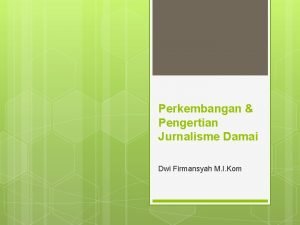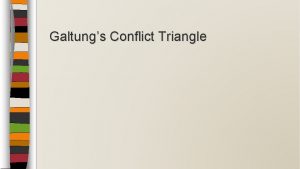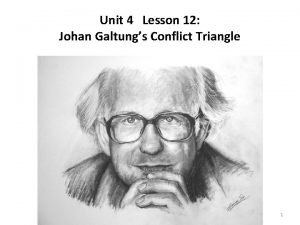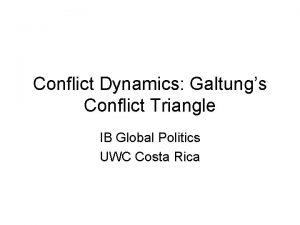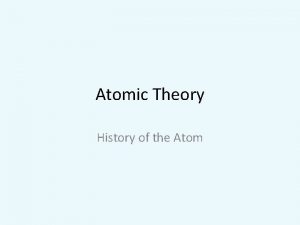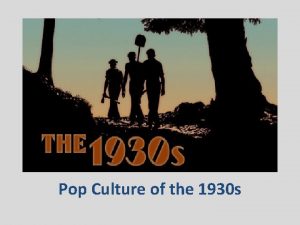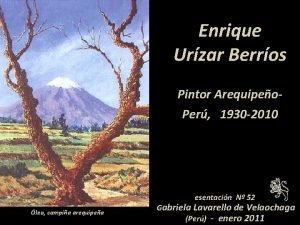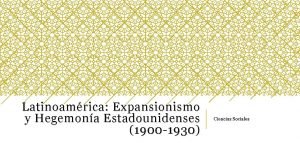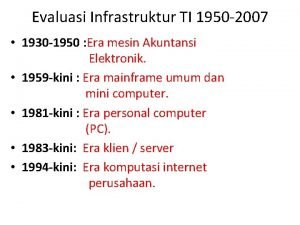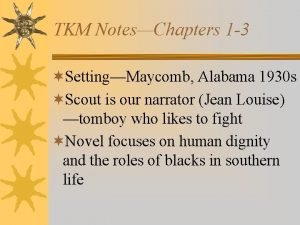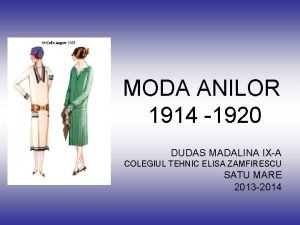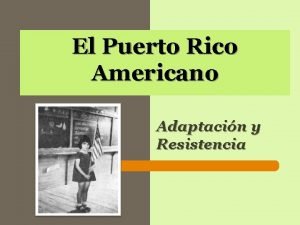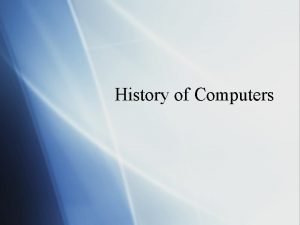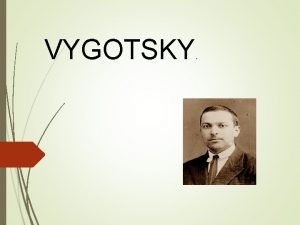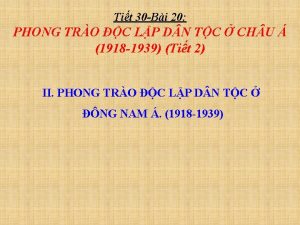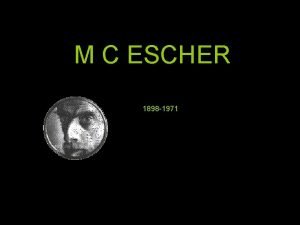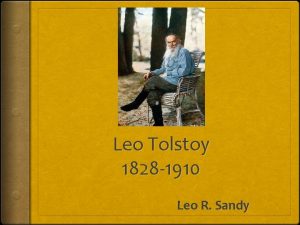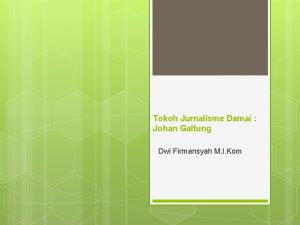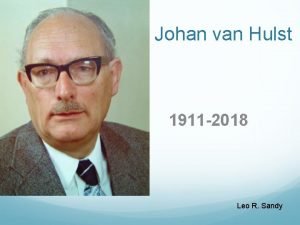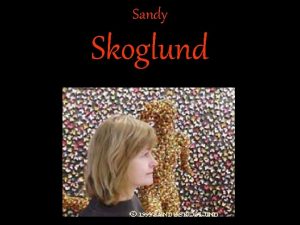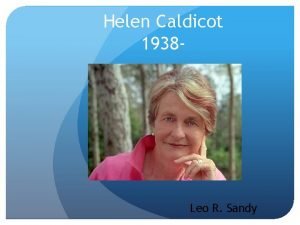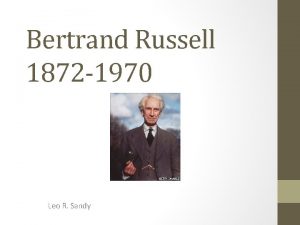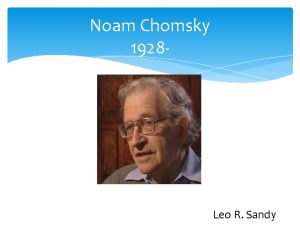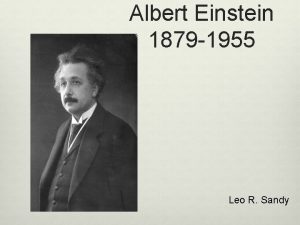Johan Galtung 1930 Leo R Sandy Johan Galtung



















- Slides: 19

Johan Galtung 1930 Leo R. Sandy

Johan Galtung • Norwegian sociologist, mathematician, and the principal founder of the discipline of peace and conflict studies. • The main founder of the Peace Research Institute Oslo in 1959 and served as its first director until 1970 • Established the Journal of Peace Research in 1964. In 1969 he was appointed to the world's first chair in peace and conflict studies, at the University of Oslo. • Resigned his Oslo professorship in 1977 and has since held professorships at several other universities

Galtung cont’d • From 1993 to 2000 he taught as Distinguished Professor of Peace Studies at the University of Hawaii • Currently based in Kuala Lumpur, where he is the first Tun Mahathir Professor of Global Peace at the International Islamic University Malaysia • Galtung is known for contributions to sociology in the 1950 s, political science in the 1960 s, economics and history in the 1970 s, macrohistory, anthropology, and theology in the 1980 s

Galtung cont’d • Has developed several influential theories, such as the distinction between positive and negative peace, structural violence, theories on conflict and conflict resolution, the concept of peacebuilding, the structural theory of imperialism, and theory of the United States as simultaneously a republic and an empire • Has often been critical of western countries in their attitude to the Global South • Has been a major intellectual figure of the New Left since the 1950 s • Was awarded the Right Livelihood Award in 1987 and has received many other prizes and accolades.

Galtung cont’d • Galtung was born in Oslo. He earned the cand. Real. (Ph. D) degree in mathematics at the University of Oslo in 1956, and a year later completed the mag. art. (Ph. D) degree in sociology at the same university • Received the first of thirteen honorary doctorates in 1975 • Galtung's father and paternal grandfather were both physicians. The Galtung name has its origins in Hordaland, where his paternal grandfather was born

Galtung cont’d • His mother, Helga Holmboe, was born in central Norway, in Trøndelag, while his father was born in Østfold, in the south. • Galtung has been married twice, and has two children by his first wife Ingrid Eide, Harald Galtung and Andreas Galtung, and two by his second wife Fumiko Nishimura, Irene Galtung and Fredrik Galtung. • Upon receiving his mag. art. degree, Galtung moved to Columbia University, in New York City, where he taught for five semesters as an assistant professor in the Department of Sociology.

Galtung cont’d • In 1959, Galtung returned to Oslo, where he founded the Peace Research Institute Oslo (PRIO) • He served as the institute's director until 1969, and saw the institute develop from a department within the Norwegian Institute of Social Research into an independent research institute with enabling funds from the Norwegian Ministry of Education • In 1964, Galtung led PRIO to establish the first academic journal devoted to Peace Studies: the Journal of Peace Research

Galtung cont’d • In the same year, he assisted in the founding of the International Peace Research Association. • In 1969 he left PRIO for a position as professor of peace and conflict research at the University of Oslo, a position he held until 1978 • He then served as the director general of the International University Centre in Dubrovnik, also serving as the president of the World Future Studies Federation • He has also held visiting positions at other universities, including Santiago, Chile, the United Nations University in Geneva, and at Columbia, Princeton, and the University of Hawaii

Galtung cont’d • He has served at so many universities that he has "probably taught more students on more campuses around the world than any other contemporary sociologist” • Galtung is currently teaching courses in the Human Science Department at Saybrook University • Galtung is a prolific researcher, having made contributions to many fields in sociology. He has published more than 1000 articles and over 100 books • Economist and fellow peace researcher Kenneth Boulding has said of Galtung that his "output is so large and so varied that it is hard to believe that it comes from a human"

Galtung cont’d • In 2014 he was appointed as the first Tun Mahathir Professor of Global Peace at the International Islamic University Malaysia • The aim of the chair is to "create greater awareness, promotion and advocacy of global peace including the protection of human rights and criminalization of war. ” • Galtung experienced World War II in Germanoccupied Norway, and as a 12 -year-old saw his father arrested by the Nazis • He was sent to prison for 6 months in Norway for refusing military service

Galtung cont’d • The Israeli newspaper Haaretz accused Galtung in May 2012 of antisemitism for: (1) suggesting the possibility of a link between the 2011 Norway attacks and Israel's intelligence agency Mossad; (2) maintaining that "six Jewish companies" control 96% of world media; (3) identifying what he contends are ironic similarities between the banking firm Goldman Sachs and the conspiratorial antisemitic forgery The Protocols of the Elders of Zion; and (4) theorizing that although not justified, antisemitism in post–World War I Germany was a predictable consequence of German Jews holding influential positions.

Galtung cont’d • On August 8, 2012, the World Peace Academy in Basel, Switzerland announced it was suspending Galtung from its organization, citing what it posited were his "reckless and offensive statements to questions that are specifically sensitive for Jews. ” • Galtung himself has vehemently repudiated the above attacks as "smearing and libel" in a published statement and a public lecture at the end of the year 2012

Galtung cont’d • Since the fall of the Soviet Union, Galtung has made several predictions of when the United States will no longer be a superpower, a stance that has attracted some controversy. In an article published in 2004, he lists 14 'contradictions' that would cause the 'decline and fall' of the US empire. • He claims the US will go through a phase as a fascist dictatorship on its path down, and that the Patriot Act is a symptom of this. Like Great Britain, Russia and France, he says the American Republic will be better off without the Empire

Galtung cont’d • According to Galtung, the US empire causes "unbearable suffering and resentment" because the "exploiters/ killers/ dominators/ alienators, and those who support the US Empire because of perceived benefits" are engaging in "unequal, non-sustainable, exchange patterns” • He said that its military and political manipulation are censured for their aggressiveness, arrogance, violence, hypocrisy and self-righteousness, as well as the US public ignorance of other cultures and extreme materialism

Galtung cont’d • One of his important concepts is structural violence – policies and structures that keeps women and minorities from achieving their potentials • Others include negative peace – the temporary absence of war while the war machine continues to exist, and positive peace – collaborative, supportive relationship between opponents engaging in proactive efforts for permanent peace

Quotes • By peace we mean the capacity to transform conflicts with empathy, without violence, and creatively- a never-ending process • Peace appeals to the hearts; studies to the brain. Both are needed, indeed indispensable. But equally indispensable is a valid link between brain and heart. And that, in a nutshell, is what peace studies and peace practice are all about • Every religion contains, in varying degrees, elements of the soft and the hard. For the sake of world peace, dialogue within religions and among them must strengthen the softer aspects.

Quotes cont’d • The topdog may win the game of force. But not the moral issue - and when that dawns upon him and his allies, change of consciousness sets in, and demoralization starts thawing the frozen heart. The game is over. • Peace equals ability to handle conflict, with empathy, nonviolence, and creativity. . .

Video • Johan Galtung at UVA (30 minutes)

References • Johan Galtung. Retrieved from https: //en. wikipedia. org/wiki/Johan_Galtung • Johan Galtung quotes. Retrieved from http: //www. azquotes. com/quote/692810 • Johan Galtung at UVA. Retrieved from https: //www. youtube. com/watch? v=2 T-Yte. Phy. Qc
 Karakteristik jurnalisme damai
Karakteristik jurnalisme damai Abc conflict triangle
Abc conflict triangle Conflict triangle theory
Conflict triangle theory Galtungs conflict triangle
Galtungs conflict triangle History of atom models
History of atom models Sale of goods act 1930 introduction
Sale of goods act 1930 introduction 1930 pop culture
1930 pop culture 2010-1930
2010-1930 Expansionismo estadounidense de 1900 a 1930
Expansionismo estadounidense de 1900 a 1930 2007-1930
2007-1930 Maycomb alabama 1930
Maycomb alabama 1930 Funding loan
Funding loan Moda anilor 20
Moda anilor 20 La bestia que sale del mar
La bestia que sale del mar El puerto rico americano adaptacion y resistencia
El puerto rico americano adaptacion y resistencia Computers in the 1930s
Computers in the 1930s Pesem srečka kosovela iz leta 1930
Pesem srečka kosovela iz leta 1930 Teoria de vigotsky
Teoria de vigotsky Nguyễn ái quốc 1930
Nguyễn ái quốc 1930 Castrovalva escher
Castrovalva escher
